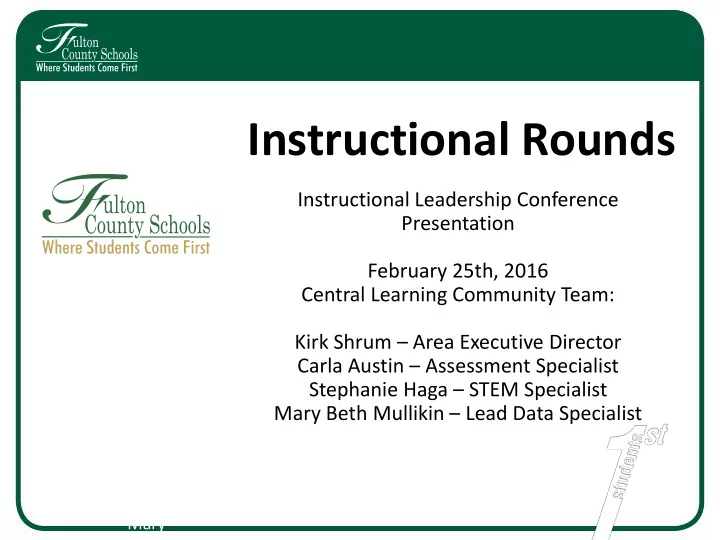

Instructional Rounds Instructional Leadership Conference Presentation February 25th, 2016 Central Learning Community Team: Kirk Shrum – Area Executive Director Carla Carla Austin – Assessment Specialist Austin Stephanie Haga – STEM Specialist Mary Beth Mullikin – Lead Data Specialist - Assessm ent Speciali st Mary Beth
So…What Are You Doing Here? What are you hoping to gain from this session? https://todaysmeet.com/CLCatILC
Goals • Understand how the CLC uses Instructional Rounds as a way to partner with schools to drive improvement. • Understand the Instructional Rounds process and its evolution from year 1 to year 3. • Participants will consider how Instructional Rounds can be used to drive improvement in their school or system.
Facts at a Glance Fulton County Schools Central Learning Community • 95,714 students • 15,025 Students • 57 elementary schools, 19 • 11 elementary schools, 3 middle schools, 17 high middle schools, 4 high schools schools, 8 charter organizations • 42% Black, 32% Hispanic, 19% • 43% Black, 14% Hispanic, 29% White White • 10% SEC • 10% SEC • 69% Free/Reduced Lunch • 45% Free/Reduced Lunch • • 13% ESL 8.2% ESL
CLC Support Team Roles District Support Personnel Title 1 Support Personnel Area Superintendent ELA Lead Area Executive Director Math Lead Humanities Specialist Data Support Lead STEM Specialist Assessment Specialist SEC Specialist Behavior Specialist
Our Driving Questions • How do we as a support team improve teacher effectiveness and increase student achievement? • How do we build the capacity of school-based leaders to increase teacher effectiveness and student achievement? It was apparent that to answer these questions our team needed to be in classrooms!
Instructional Rounds…How it Began Year 1 observations focused on the core components of effective instruction – teacher, content, and tasks.
The Early Process Year 1 Year 2
Reflections • Year 2 • Year 1 • Rounds expanded to all CLC • Team presence in lowest schools performing schools • Feedback was aligned to • Schools not held evaluation system accountable for responding • School administrative teams to the feedback, team not became part of the rounds present in all CLC schools • Schools selected the focus • Lack of focus of rounds but resulted in • School leadership teams did lack of unified focus • Impact was not measurable not participate in the on student achievement rounds
Refinement…The Need for Focus Old Expectations New Expectations
11
Refinement…The Need for Focus • Instructional Rounds were not resulting in measurable academic growth • Based on student performance, and the instructional shifts needed to meet new standards, we shifted our focus to Rigor and Relevance as a way to support our schools • Our learning community partnered with The International Center for Leadership in Education to provide training to our leadership teams • Our instructional rounds are focused on providing input to schools using the Rigor and Relevance Framework
Rigor and Relevance
Current Instructional Rounds Process: Before Classroom Visits • Assemble the team • Discuss instructional focus and progress with school admin team • Review rigor and relevance framework and feedback from
Current Instructional Rounds Process: During • Conduct classroom observations • After each classroom visit the teams debrief to reach consensus on where the lesson will be ranked
Current Instructional Rounds Process: After Plot lessons, discuss pluses, discuss "How to Bump It Up"
Year 3
Principals Perspective
• https://youtu.be/rALd6V26mr0
CLC Elementary School Example =1 st Round =2 nd Round
Turn and Talk How do think your leadership team/schools would accept feedback from an outside group? School: What would you need in order for you to trust and act on feedback from a district team? District: What would you need to do to ensure that schools will trust the feedback you provide?
Round 1 Results • 299 Total Classrooms – 196 Elementary – 49 Middle School – 54 High School
Learning Community Growth Round 1 Round 2 3% 9% 13% 8% 15% 61% 11% 80% Quad A Quad B Quad C Quad D Quad A Quad B Quad C Quad D
Correlation With Student Achievement Lowest % of Quad A Lessons Largest SGP’s in Largest Largest decrease STAR Reading Increases in in MS/HS course and Math Lexile Levels failures
Next Steps • Continue instructional rounds to improve teacher effectiveness and student achievement • Partnership with TNTP to create a vision for effective instruction in ELA/Math and develop rubrics to use for instructional rounds • Focus on providing content specific feedback • Continually reflect and refine process
Turn and Talk How could the Instructional Rounds can be used to drive improvement in your school or system? What changes might you make to meet your unique needs?
Questions
Recommend
More recommend